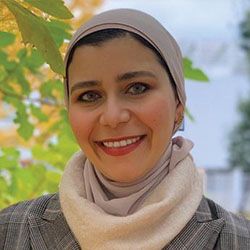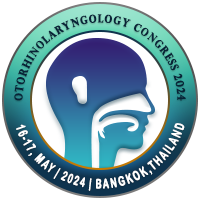
Mai Mohamed Bedeir
Kyoto Prefectural University of Medicine, JapanTitle: Multiplex immunohistochemistry optimized protocol for the cochlear tissue
Abstract
Multiplex immunohistochemistry (mIHC) is a powerful investigating tool that provides quantitative data about immune cells in the context of expressed markers, count, and location. mIHC has been used in cancer research for understanding the disease prognosis by providing precious information about immune cells. In inner ear research immune cells have mainly been investigated by flow cytometry, conventional immunohistochemistry (IHC), and reverse transcription-quantitative polymerase chain reaction (RT-qPCR). However, these techniques have several limitations; for instance, flow cytometry provides bulk information, but the histological location is missing because it is performed on cell suspension. In contrast, conventional IHC retains the histological locations among the tissue but it lacks multi-parameter details. The mIHC forms a bridge between flow cytometry and conventional IHC, providing multi-information and preserving spatial data. The main challenge is that the mIHC involves many handling steps for the investigated tissue, which could be vulnerable to the delicate cochlear tissue. Therefore, our presentation introduces an optimized mIHC protocol for delicate cochlear tissue. The presentation highlights the factors that helps to use mIHC successfully while preserving the tissue details.
mIHC consists of sequential cycles of immunostaining, each cycle formed of incubating primary antibody followed by secondary antibody, then chromogenic staining. The final step is image scanning using a digital slide scanner. To prepare the tissue for the next cycle antigen retrieval step is done to strip out the residual antibodies and regain tissue vitality. The optimized mIHC protocol indicates that cochlear tissue needs mild antigen retrieval method which successfully removed the antibodies and preserved tissue structure. Moreover, we detected that short incubation period of the primary antibody reduces the noisy background and provide clear signal. These adjustments could reduce tissue damage and provide best results for investigating immune cells.
Biography
Mai Mohamed Bedeir is an otologist, has obtained her medical degree from Cairo University and completed her Master degree at Nagoya University. Currently, she is PhD candidate at the department of Otolaryngology–Head and Neck surgery, Kyoto Prefectural University of Medicine, Kyoto, Japan. Currently, her research mainly related to inner ear macrophages. She got a fund for international otolaryngology researchers from the Society for Promotion of International Oto-Rhino-Laryngology (SPIO) 2021. Published a paper about inner ear macrophages diversity in 2022.

